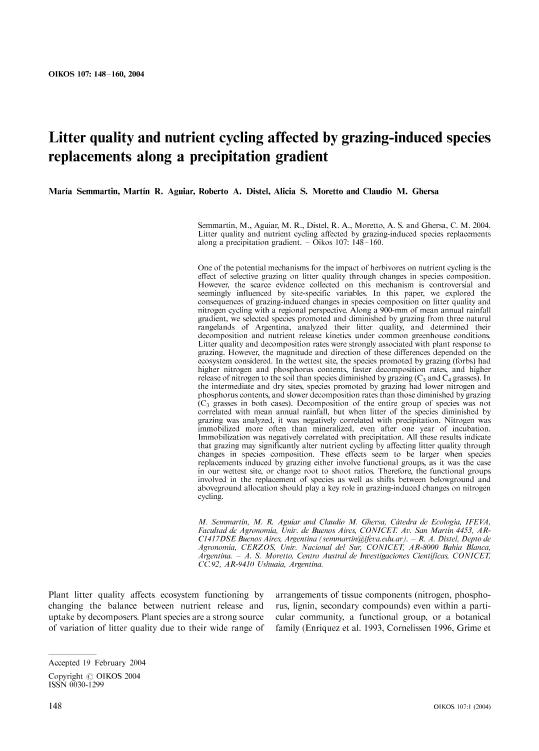Artículo
Litter Quality and Nutrient Cycling Affected by Grazing-Induced Species Replacements along a Precipitation Gradient
Semmartin, María Gisela ; Aguiar, Martin Roberto
; Aguiar, Martin Roberto ; Distel, Roberto Alejandro
; Distel, Roberto Alejandro ; Moretto, Alicia Susana
; Moretto, Alicia Susana ; Ghersa, Claudio Marco
; Ghersa, Claudio Marco
 ; Aguiar, Martin Roberto
; Aguiar, Martin Roberto ; Distel, Roberto Alejandro
; Distel, Roberto Alejandro ; Moretto, Alicia Susana
; Moretto, Alicia Susana ; Ghersa, Claudio Marco
; Ghersa, Claudio Marco
Fecha de publicación:
10/2004
Editorial:
Wiley Blackwell Publishing, Inc
Revista:
Oikos
ISSN:
0030-1299
e-ISSN:
1600-0706
Idioma:
Inglés
Tipo de recurso:
Artículo publicado
Clasificación temática:
Resumen
One of the potential mechanisms for the impact of herbivores on nutrient cycling is the effect of selective grazing on litter quality through changes in species composition. However, the scarce evidence collected on this mechanism is controversial and seemingly influenced by site-specific variables. In this paper, we explored the consequences of grazing-induced changes in species composition on litter quality and nitrogen cycling with a regional perspective. Along a 900-mm of mean annual rainfall gradient, we selected species promoted and diminished by grazing from three natural rangelands of Argentina, analyzed their litter quality, and determined their decomposition and nutrient release kinetics under common greenhouse conditions. Litter quality and decomposition rates were strongly associated with plant response to grazing. However, the magnitude and direction of these differences depended on the ecosystem considered. In the wettest site, the species promoted by grazing (forbs) had higher nitrogen and phosphorus contents, faster decomposition rates, and higher release of nitrogen to the soil than species diminished by grazing (C3 and C4 grasses). In the intermediate and dry sites, species promoted by grazing had lower nitrogen and phosphorus contents, and slower decomposition rates than those diminished by grazing (C3 grasses in both cases). Decomposition of the entire group of species was not correlated with mean annual rainfall, but when litter of the species diminished by grazing was analyzed, it was negatively correlated with precipitation. Nitrogen was immobilized more often than mineralized, even after one year of incubation. Immobilization was negatively correlated with precipitation. All these results indicate that grazing may significantly alter nutrient cycling by affecting litter quality through changes in species composition. These effects seem to be larger when species replacements induced by grazing either involve functional groups, as it was the case in our wettest site, or change root to shoot ratios. Therefore, the functional groups involved in the replacement of species as well as shifts between belowground and aboveground allocation should play a key role in grazing-induced changes on nitrogen cycling.
Palabras clave:
Litter Quality
,
Nutrient Cycling
,
Precipitation
,
Grazing
Archivos asociados
Licencia
Identificadores
Colecciones
Articulos(CERZOS)
Articulos de CENTRO REC.NAT.RENOVABLES DE ZONA SEMIARIDA(I)
Articulos de CENTRO REC.NAT.RENOVABLES DE ZONA SEMIARIDA(I)
Citación
Semmartin, María Gisela; Aguiar, Martin Roberto; Distel, Roberto Alejandro; Moretto, Alicia Susana; Ghersa, Claudio Marco; Litter Quality and Nutrient Cycling Affected by Grazing-Induced Species Replacements along a Precipitation Gradient; Wiley Blackwell Publishing, Inc; Oikos; 107; 1; 10-2004; 148-160
Compartir
Altmétricas



